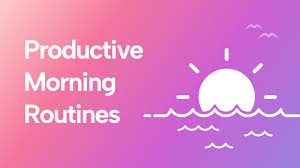The world’s most successful individuals often laud the power of productive morning routines. While varying widely in nature, these productive morning routines share a common theme – they start the day with purpose, intention, and focus (Randler, 2009). But how can you tailor a productive morning routine to maximize your own productivity and wellness? To answer this, we’ll explore the psychological principles behind some of the most effective productive morning routine habits.
1. Wake Up Early
The proverbial early bird gets the worm, or so the saying goes. Beyond being an old adage, research indicates that individuals who wake up early often exhibit traits like proactivity, optimism, and conscientiousness, all of which are tied to personal and professional success (Randler, 2009). Early risers are gifted with quiet hours, free of distractions, enabling focused work, strategic planning, and goal setting.

2. Hydrate
Sleeping hours are a fasting period during which your body continues essential functions, using up water reserves. Waking up and drinking water first thing in the morning helps rehydrate your body, kickstart your metabolism, and initiate optimal cognitive function, all essential for maximizing productivity (Popkin, D’Anci, & Rosenberg, 2010).
3. Mindfulness Meditation
Research consistently shows that regular mindfulness meditation reduces stress, increases focus, and improves emotional well-being (Chiesa & Serretti, 2009). A few minutes of meditation every morning can lead to greater self-awareness, improved concentration, and a calmer state of mind to handle the day’s challenges.

4. Exercise
Morning exercise, whether a high-intensity workout or a calming yoga session, can enhance mood, boost energy levels, and improve overall health. This effect is due to increased serotonin and endorphins, known as ‘feel-good’ hormones (Meeusen, 2005). Even a brisk walk can bring about these benefits, starting your day on a positive note.
5. Healthy Breakfast
Breakfast is the fuel that gets your body and brain running. Consuming a nutritious breakfast has been linked to improved cognitive function, including memory, attention, and executive functions (Adolphus, Lawton, & Dye, 2013). Balancing protein, healthy fats, and complex carbohydrates can provide sustained energy throughout the morning.
6. Prioritize Your Day
Identifying your Most Important Tasks (MITs) for the day helps increase productivity and reduce decision fatigue. This practice aligns with the psychological principle of goal setting, which enhances motivation and self-efficacy (Locke & Latham, 2002). It also allows you to focus on tasks that impact the most significantly.
7. Engage in Learning
Early morning is an ideal time for learning, as our brains are generally more receptive to new information at this time (Folkard, Monk, Bradbury, & Rosenthall, 1977). This could involve reading a book, learning a new language, or diving into an educational podcast, all stimulating cognitive function and keeping you updated in your field of interest.
8. Practice Gratitude
Gratitude has been linked to a host of psychological benefits, including increased happiness, reduced depression, and a positive outlook on life (Emmons & McCullough, 2003). Starting your day by acknowledging your gratitude fosters a positive mindset and encourages a broader perspective on life’s challenges.

9. Visualization
Many successful individuals swear by the practice of visualization. This involves mentally rehearsing the success of your day, which primes the brain for high performance. This strategy has been shown to improve performance in various areas, from sports to academic exams (Cumming & Williams, 2012).
10. Affirmations
When repeated, affirmations are positive statements that can improve your mindset, overcome self-limiting beliefs, and promote self-confidence. Neuroscience research suggests that affirmations activate brain systems associated with self-related processing and reward, enhancing a positive self-identity (Cascio et al., 2016).
11. Creative Endeavors
Engaging in a creative activity first thing in the morning can unlock innovative thinking and boost your mood. Activities like journaling, sketching, or playing a musical instrument can awaken the creative side of your brain and stimulate cognitive flexibility, enhancing problem-solving and decision-making skills throughout the day.
12. Digital Detox
In our hyper-connected world, starting your day without immediately checking emails or social media can provide a mental ‘breathing space’. This digital detox encourages you to begin your day on your own terms rather than responding to external demands, fostering greater mindfulness and focus.
Understanding the psychology behind these morning practices allows you to create a routine tailored to your needs, setting the stage for daily productivity and overall well-being. Remember, consistency is key. While adjusting to your new routine might take time, the benefits you’ll reap are well worth the effort.

Here are a few of our most recent blog posts:
- Time Management Hacks for ADHD: How to Keep Your Focus and Get Things Done!
- Tips on Boosting Self-Confidence for Teens
- Common Meditation Problems
- Common Goal Setting Obstacles and How to Maneuver around Them
- Committing Yourself to Positive Actions
If you’d like to follow me on social media, you can find all of my links HERE
Get It Done Faster!

Just click the picture to get your free copy now!
Includes free eBook AND free workbook, including worksheets and instructions for each of the techniques!
Designed specifically for those on the go, dive deep into the art of rapid productivity. Every moment matters; make the most of it.
In a world that incessantly pushes for more hours, more hustle, and more grind, a revolutionary approach is quietly rewriting the rules of productivity. Have you ever found yourself staring at the clock, wondering where the day went and why your to-do list remains untouched? You’re not alone. The common belief is that longer hours equate to more accomplishments, but what if the key isn’t more time, but how you use it?
Introducing “Get It Done Faster” — a game-changing technique that capitalizes on our brain’s natural rhythms and energy peaks. Instead of laboring for hours on end and burning out, imagine achieving more in short, focused intervals, punctuated by refreshing breaks. It’s not about working harder; it’s about working smarter. This method, inspired by tools like the Pomodoro technique and the Eisenhower matrix, taps into the sweet spot of productivity, ensuring that you’re operating at your peak when it matters most.
The links on this page may be affiliate links. That means that if you make a purchase using these links, I may receive a commission. This does not change the cost for you.
The links on this page may be affiliate links. That means that if you make a purchase using these links, I may receive a commission. This does not change the cost for you.


Leave a Reply